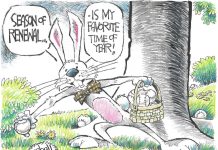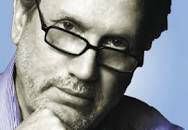The first person my father consulted in 1949 when he decided to build a house and a four-unit motel along State Road 9 south of Hope was an old man who had a local reputation as a “water witch.”
Our whole family tagged along one autumn afternoon as Dad followed the man across a rutted, former cornfield — directed mysteriously by a forked willow branch the “witch” held in front of himself at arm’s length. The longest part of the branch danced a bit as we walked — the old man grasping the two smaller branches from the fork in his calloused hands.
About halfway across that acre of ground Dad intended to buy with the help of the Building and Loan Association, the old man stopped and the branch dipped to the ground as if it had been pulled by a powerful magnet. By the next summer, the well would be dug and my dad and my uncle would be in the process of building us a new home.
The consensus of science — then and, even more, now — is that we were all just lucky that day. Bartholomew County has a lot of underground water, so the odds are pretty good that a person could drill a well about anywhere and have a “fair to middlin” chance of finding it.
[sc:text-divider text-divider-title=”Story continues below gallery” ]
Still, among the believers, “water witching” (sometimes called dowsing) has proven itself and “science be damned.” Although numerous scientific experiments over the past 150 years have concluded that the results of water dowsing are no more accurate than simply guessing, the believers are undeterred.
Through the years I have been acquainted with — even written about — “water witches,” and must admit their skills have intrigued me. Arguably, the best known of Bartholomew County “water witches” was the late Homer Arnholt, who owned a farm just north of Columbus on what is now Indianapolis Road. His skills were the subject of several newspaper articles and he once was featured in a program aired on WISH-TV in Indianapolis.
I met Homer in 1965 when I was a 20-year-old reporter assigned to write a story about “water witching” — a term he rejected as a devout Christian in favor of “water finding.” His history of finding water — even in places where those with geological training had failed — was well-documented. Even several local engineers who “officially” rejected dowsing as “pseudoscience,” confided to me “off the record” that they had used his services from time to time.
Homer demonstrated his techniques to me and even let me give it a try to see if I have “the gift.” (I don’t.)
He used a willow branch, because he said willows grow near water and have a natural magnetism to water. He said others use peach branches or metal rods, but he had been less impressed with the accuracy.
In addition to the willow branch dipping down to indicate the location of water, Homer said he could squat down and hold a long, single branch over the spot to determine how far down the water was. The branch would dip down — tapping the ground once for each five feet in depth. He also claimed he could use two metal rods crossed in front of himself to determine the type of rock and sediment the driller would have to bore through to get to the water.
Homer started out just dowsing for friends and neighbors and didn’t begin charging a small fee until he was in his 70s — only doing that to discourage drillers from filling his schedule after he retired from farming.
A deeply religious Lutheran, Homer said he could not explain his gift apart from his belief that it was from God and something he had not “earned.” He said his father did not have the gift, but one of his three children “could do it a bit.”
One thing I know for sure, Homer Arnholt was not a phony. He believed in what he did, and he was not amazed, just grateful.
He had no desire to explain anything “scientifically.” And many engineers, contractors, drillers and others whose belief systems rested on geological evidence and mathematical calculations, rather than the preferences of willow branches, could hardly dispute his record of success.
My own view in the matter is pretty well summed up in a quote from author/pop theological S. Kelley Harrell: “I don’t argue things being spiritual vs scientific, because I’ve never met anyone who knows enough about either to be convincing — including myself.”
Bud Herron is a retired editor and newspaper publisher who lives in Columbus. He served as publisher of The Republic from 1998 to 2007. His weekly column appears on the Opinion page each Sunday. Contact him at [email protected].



